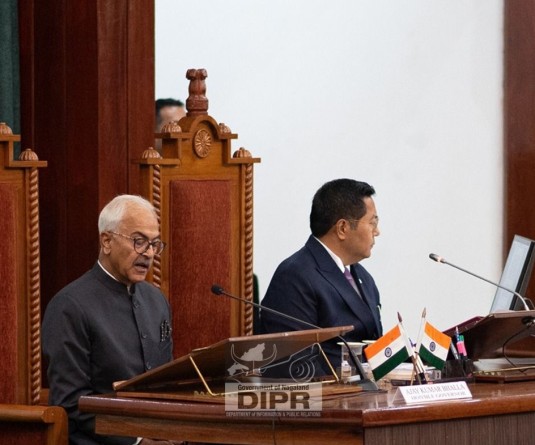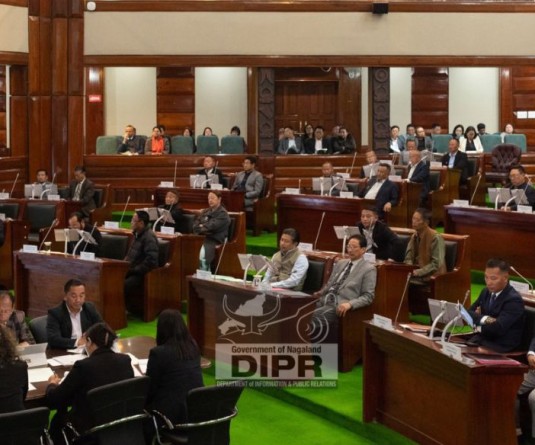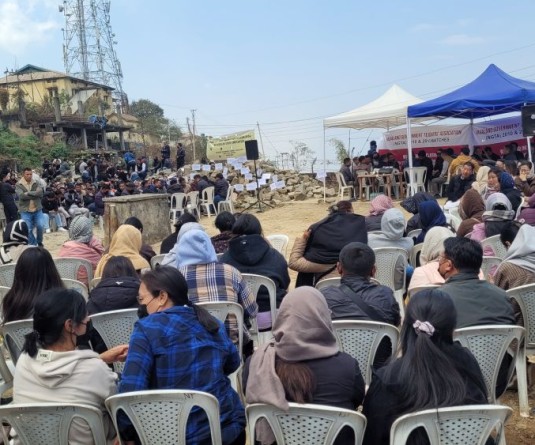
Morung Express News
Chumoukedima | August 20
The Angami Youth Organisation (AYO) held its first seminar in the Chakhro region, in commemoration of its 25 years of celebration, at Niathu Resort, Chumoukedima on August 20. The seminar was held on the topic ‘Angami Ethos’ with Kezhalenuo Kesiezie, Additional Director, SCERT Nagaland and Dr. Visier Sanyü Meyasetsu, President, Overseas Naga Association as the resource persons and Ruokuo Kire, Social Activist, Khriehuto Tsira, State Athletic Coach, and Villo Naleo, Lecturer SBS as the panelists.
In her discourse, Kezhalenuo Kesiezie focused on some important Angami ethos practiced and valued in the Angami community such as magnanimity, respect for elders, taboo, depth and meaning of a person’s name, and addressing people in the community. “If a people loses its ethos, it loses respect,” posited Kesiezie, citing that one of the most important ethos of the Angamis was ‘Kethezie kecü’ which does not have an actual English term but can be loosely translated as magnanimity. The principle of ‘Kethezie Kecü’ defined the social life of Angamis and their relation with their neighbours and guests. Respecting elders was and is another crucial ethos where youngsters are taught to respect and fear elders. An important adage of the Angamis was “Even when the sun sets, one must obey elders,” it was pointed out.
One ethos that carried maximum weightage in the Angami society was ‘Kenyü’ or taboo which forbade people from committing various wrongs. The fourth ethos that Kesiezie highlighted was the meaning in a person’s name. Like most indigenous peoples in the world, the Angamis consider one’s name as a responsibility. Therefore, a name is given with careful contemplation. A name is also considered the first blessings of the parents to their child. The fifth ethos is addressing a person. The Angami tribe has terminologies for certain kinship relations which was a mark of respect to others and highly valued.
Believing that ethos are the fundamental character or spirit of culture and the underline sentiments that informs the beliefs, customs of a society, Dr. Visier gave a comparison between other nations’ ethos and Nagas’ ethos. While there are good ethos, Dr. Visier also pointed out that there are negative ethos which can destroy societies. Japanese ‘Kaizen’, mentioned Dr. Visier, is a practice of continuous improvement where everyone is involved in making improvements. While Tlawmngaihna among the Mizos is a cultural concept that incorporates behavior of self-sacrifice and self-denial, one of spontaneous humble social work without demands or expectations.
The community and the clan is the greatest ethos in the Angami community, stated Dr. Visier, where social capital is more important than the individual’s wealth which can be shown in the practise of the ‘Feast of Merit’ among Nagas. The practice of the Feast of Merit among Angamis was an indication of distribution of wealth to the entire community. “We blessed others, we wished people well. We did not take the best part for ourselves, we gave the best to others,” said Dr. Visier, expressing regret that these ethos are diminishing in the present Naga society which has been overtaken by greed and selfishness. While nations and peoples have learned to make adjustments and improvised itself with the rapid changes and advancement, Naga society is witnessing regression, he lamented. Therefore, Dr. Visier appealed for the Angami peoples to revive and live its rich ethos and values again so that Naga society can progress with the changing times.






